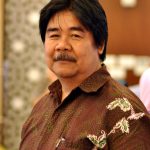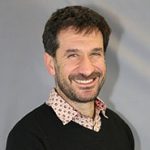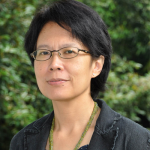International Virtual Course Biomanagement 2023
Climate change can be indicated by change in temperature and weather patterns in a long-term. In 2021, the global mean temperature was 1.1°C above the pre-industrial temperature and were projected to increase for the next five years. One of the contributors of climate change is human activities since 1800s mainly because of burning of fossil fuels (UN, 2023). Other activities such as opening land for agricultural activities, housing, buildings, can also emit greenhouse gases that causing climate change. The impact of climate change affects organisms to ecosystem levels, and it is a threat of life on earth. Climate change therefore is a global concern, so the mitigation of climate change becomes important. Action on climate change mitigation also one of integral part to achieve UN’s Sustainable Development Goals (SDGs).
Climate change mitigation in general can be accomplished through reducing the emission of greenhouse gases (GHGs) into the atmosphere because there is a direct relation of GHGs and global average temperature. For example, enhancing the carbon sinks for example increasing forest area, reducing the greenhouse gas emission in all activities (agriculture, forestry, food manufacture, etc). Global warming mitigation therefore cannot be separated with bioresources management to optimize the sustainable use of bioresource at all biodiversity levels.
Indonesia is one of distinctive country with ten thousand of islands spread out in the equator therefore Indonesia has tropical climate. Indonesia is the 5th of the most densely populated country in the world (FAO, 2003) meaning that Indonesia has abundance human resources. Indonesia also rich in biodiversity from all levels of biological organization from genetics to ecosystem therefore, the potential for bioresources is high. In addition, the richness of ethnicity is also one of the uniqueness of Indonesia. Each ethnicity has traditional knowledge in relation with biodiversity and how to manage in local scale. Despite its uniqueness, climate change will impact Indonesia severely. The management of biodiversity and bioresource in Indonesia should be a part in development planning.
The discussion on how to mitigate climate change therefore is important. This issue has prompted us to discuss it in an International Virtual Course entitled “Climate Change Mitigation Through Green Technology, Bioresource Management and Community Empowerment” This activity is expected to provide adequate integrated insight, especially for students, both from ITB and other universities in Indonesia and abroad, as lessons learned to understand actions that can be performed to mitigate climate change.
Title
Climate Change Mitigation through Green Technology, Bioresource Management and Community Empowerment
Time
5 – 16th June 2023
Venue
International Virtual Course in Biomanagement in Zoom Meeting
Speakers
1. The Anthropology Institute, University of Neuchatel. Swiss
2. Colorado State University
3. Universiti Putra Malaysia
4. Seoul National Universty, South Korea
5. School of Life Sciences and Technology, ITB, Indonesia
6. School of Bussiness and Management, ITB, Indonesia
7. Faculty of Art and Design, ITB, Indonesia
8. Faculty of Mathematics and Natural Science, ITB, Indonesia
9. IPB University, Indonesia
10. Center for International Forestry Research – The International Centre for Research in Agroforestry (CIFOR-ICRAF)*
12. Yayasan Pilar Tunas Nusa Lestari
13. Verstegen Spices & Sauces B.V.
14. ICRAF – CIFOR
The course is providing an integrated insight as lessons learned to understand the climate change and how to mitigate climate change through technology, management of bioresources, and through community. The lecture will be provided by experts of the fields. The lecture will be divided into 2 sessions. There will be mid-term examination and final-term examination for students. Below is schedule for the lectures:
|
Date |
Activity | Time (Western Indonesia Time (UTC+7) | Speaker/PIC |
Topic |
| 5th June 2023 | Opening Ceremony | 09.00 – 10.00 | Organizing Committee | Opening Ceremony and Programme Overview |
| Lecture 1 | 10.00 – 11.40 | Prof. Intan Ahmad, Ph.D** | Bioresource management | |
| 6th June 2023 | Lecture 2 | 09.00 – 10.40 | Deny Willy Junaidy, S.Sn., M.T., Ph.D** | Sustainable Utilization of Rattan Materials: Pioneering Products for Forward-Looking Industries |
| Lecture 3 | 13.00 – 14.40 | Assoc. Prof. Dr. Samsuzana Abd Azis** | Green technology | |
| 7th June 2023 | Lecture 4 | 09.00 – 10.40 | Dr. Devi Nandita Choesin* | Wetland and Climate Change |
| Lecture 5 | 13.00 – 14.40 | Prof. Dr. Bambang Hero Saharjo, M.Agr* | Forest Fire Control and Management | |
| 8th June 2023 | Lecture 6 | 09.00 – 10.40 | Gilmee Davids** | Sustainable Spices Initiatives |
| Lecture 7 | 13.00 – 14.40 | Dr. Mooyoung Han** | Rainwater management (Rainwater Initiatives-Rain School Projects) | |
| 9th June 2023 | Mid Term Examination | 09.00 – 11.00 | Organizing Committee | Mid Term Examination |
| 12th June 2023 | Lecture 8 | 09.00 – 10.40 | Dr. Bonface Manono** | From healthy soil to healthy community: the role of soil in climate change mitigation |
| Lecture 9 | 13.00 – 14.40 | Dr. Ramalis Sobandi, M.T.** | Micro-food forest for climate change mitigation and food security | |
| 13th June 2023 | Lecture 10 | 09.00 – 10.40 | Dr. Acep Purqon, ** | Data Science for Green Technology & Sustainability |
| 14th June 2023 | Lecture 11 | 09.00 – 10.40 | Angga Dwiartama, S.Si, M.Si, Ph.D ** | Understanding the impacts of climate change on rural communities |
| Lecture 12 | 13.00 – 14.40 | Prof. Dr. Jeremie Forney* | The role of social science approach in designing and developing a sustainable agriculture system | |
| 15th June 2023 | Lecture 13 | 09.00 – 10.40 | Dr. Melia Famiola Hariadi S.T.P., M.T** | Community Empowerment for Climate Change. Case Study in Indonesian Non-Profit organisastion |
| Lecture 14 | 13.00 – 14.40 | CIFOR-ICRAF** | Building a climate-resilient community through sustainable livelihood strategies | |
| 16th June 2023 | Final Term Examination | 09.00 – 11.00 | Organizing Committee | Final Term Examination |
| Closing Ceremony | 11.00 – 12.00 | Organizing Committee | Closing Ceremony and Announcement |
* Fixed schedule
** Schedule can be change according to speaker schedule

School of Life Science and Technology – Institut Teknologi Bandung

Faculty of Art and Design – Institut Teknologi Bandung

Department of Biological and Agricultural Engineering, Universiti Putra Malaysia

Faculty of Forestry – IPB University

School of Business and Management – Institut Teknologi Bandung

School of Life Science and Technology – Institut Teknologi Bandung

Verstegen Spices & Sauces B.V.

Emeritus of Seoul National University/Rain For All (NGO based in Korea)

Extension Regional Specialist, Colorado State University

Yayasan Pilar Tunas Nusa Lestari

Faculty of Mathematics and Natural Sciences – Institut Teknologi Bandung

School of Life Science and Technology – Institut Teknologi Bandung

The Anthropology Institute, University of Neuchatel – Swiss

CIFOR – ICRAF
Requirements
1. Registered as an graduate / doctoral student at home university, or professionals
2. Student ID Card or employee card
3. Copy of passport or national ID
4. Passport-sized photograph
5. Motivation letter
6. Must agree to abide by the rules and regulations of ITB or SITH
7. Agrees to be responsible for the costs incurred (for professionals and non-ITB Indonesian students)
(Submit point 2 to 5 to https://admission.itb.ac.id/registration/nonreguler/ivc)
To be eligible for credit, you must fulfill the following requirements :
1. Maintain a minimum attendance of 80% (attendance records will include student number, lecturer, topic, and a one-paragraph summary).
2. Successfully complete the exam with a minimum score of 75



